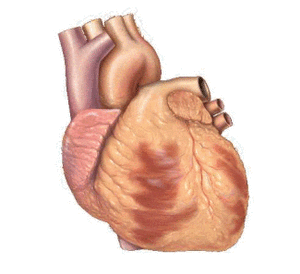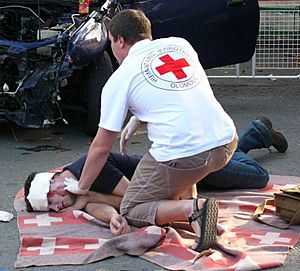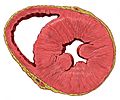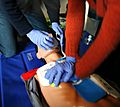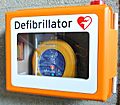Cardiac arrest facts for kids
Cardiac arrest happens when a person's heart suddenly stops beating. This means the heart can no longer pump blood to the rest of the body. When the heart stops, blood cannot carry oxygen to important organs like the brain.
Without oxygen, the body's cells start to die. If the brain doesn't get oxygen, a person will lose consciousness and stop breathing. This can lead to serious brain damage in just a few minutes.
Cardiac arrest is a very serious medical emergency. It needs immediate help to give the person the best chance to recover. When cardiac arrest causes someone to die, it's called sudden cardiac death.
Contents
What to do in a Cardiac Arrest
If someone has a cardiac arrest, it's important to act fast. The first step is usually to start cardiopulmonary resuscitation (CPR). CPR helps keep oxygenated blood moving through the body until medical help arrives.
What Causes Cardiac Arrest?
Cardiac arrest can happen for many reasons. Most often, it's linked to problems with the heart itself.
Heart-Related Causes
- Coronary artery disease: This is when the blood vessels that supply the heart become narrow.
- Heart attack: A heart attack happens when part of the heart muscle doesn't get enough oxygen and starts to die. This can sometimes lead to cardiac arrest.
- Heart structure problems: Sometimes, the heart's shape or structure can be damaged.
- Inherited heart rhythm problems: Some people are born with conditions that make their heart beat irregularly.
Other Causes
- Breathing problems: If someone stops breathing, their heart will eventually stop too.
- Diabetes: This condition can affect the heart over time.
- Certain medicines: Some medications can have side effects that affect the heart.
- Serious injuries: Trauma to the body can sometimes lead to cardiac arrest.
Who is at Risk?
Some things can make a person more likely to have a cardiac arrest.
- Age: The risk generally increases as people get older.
- Heart conditions: Having other heart diseases makes it more likely.
- Past cardiac arrest: If someone has had one cardiac arrest, they are at higher risk for another.
- Smoking: Smoking cigarettes greatly increases the risk of heart problems.
- High blood pressure: This puts extra strain on the heart.
- High cholesterol: Too much cholesterol can block blood vessels.
- Lack of exercise: Being inactive can weaken the heart.
- Obesity: Being overweight can increase the risk of heart disease.
- Diabetes: This condition can damage blood vessels and the heart.
- Family history: If close family members have had heart problems, the risk might be higher.
How is Cardiac Arrest Diagnosed?
When someone has a cardiac arrest, the most important sign is that they do not have a pulse. This means their heart is not pumping blood.
Medical professionals will also use equipment like an EKG (electrocardiogram). This machine checks the electrical activity of the heart. It helps them understand why the heart stopped and how to treat it.
It's important to remember that if someone is unconscious and not breathing normally, CPR should be started right away. Waiting to find a pulse can waste precious time.
Images for kids
See also
 In Spanish: Paro cardiorrespiratorio para niños
In Spanish: Paro cardiorrespiratorio para niños


